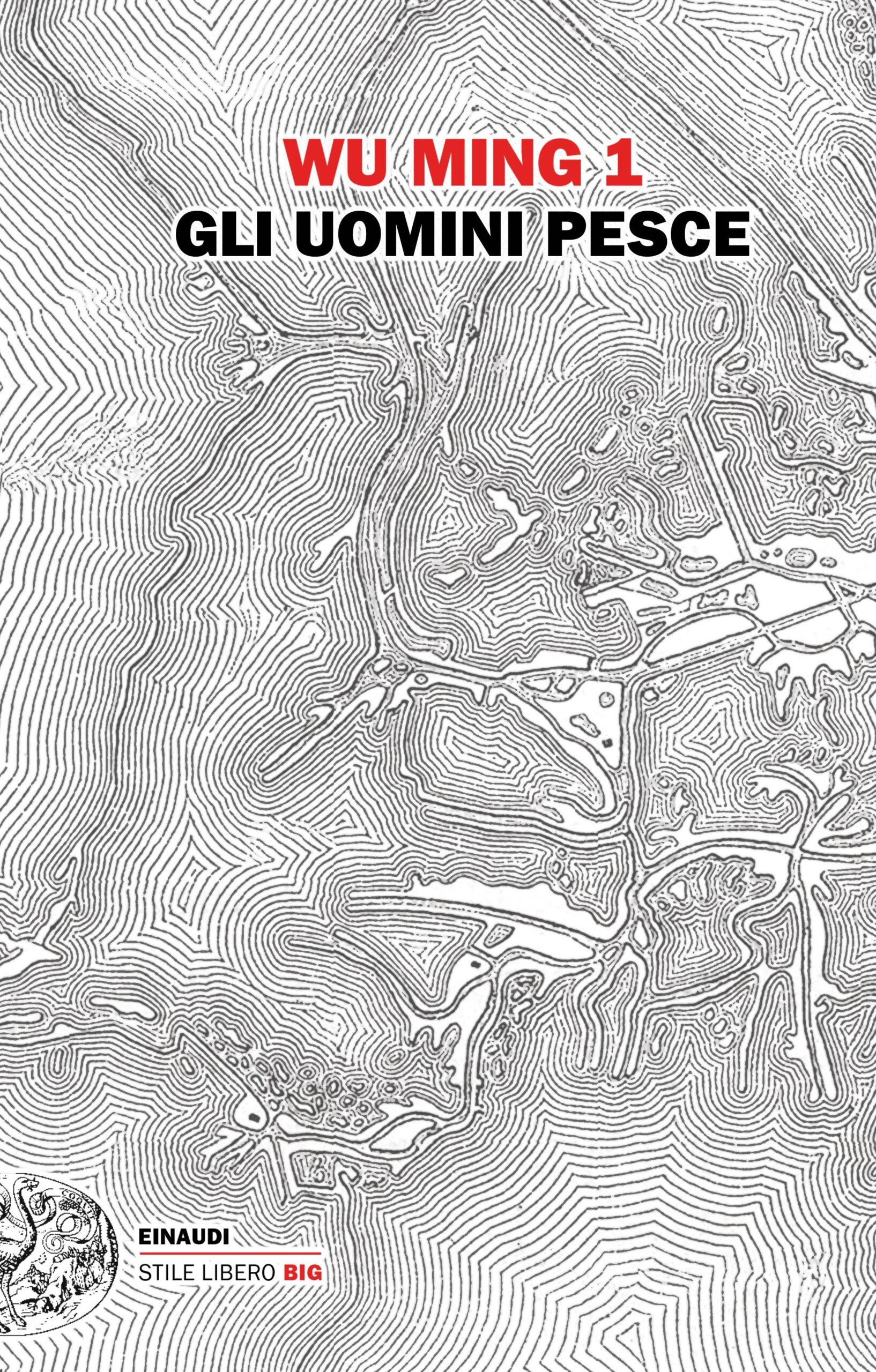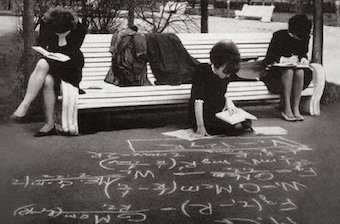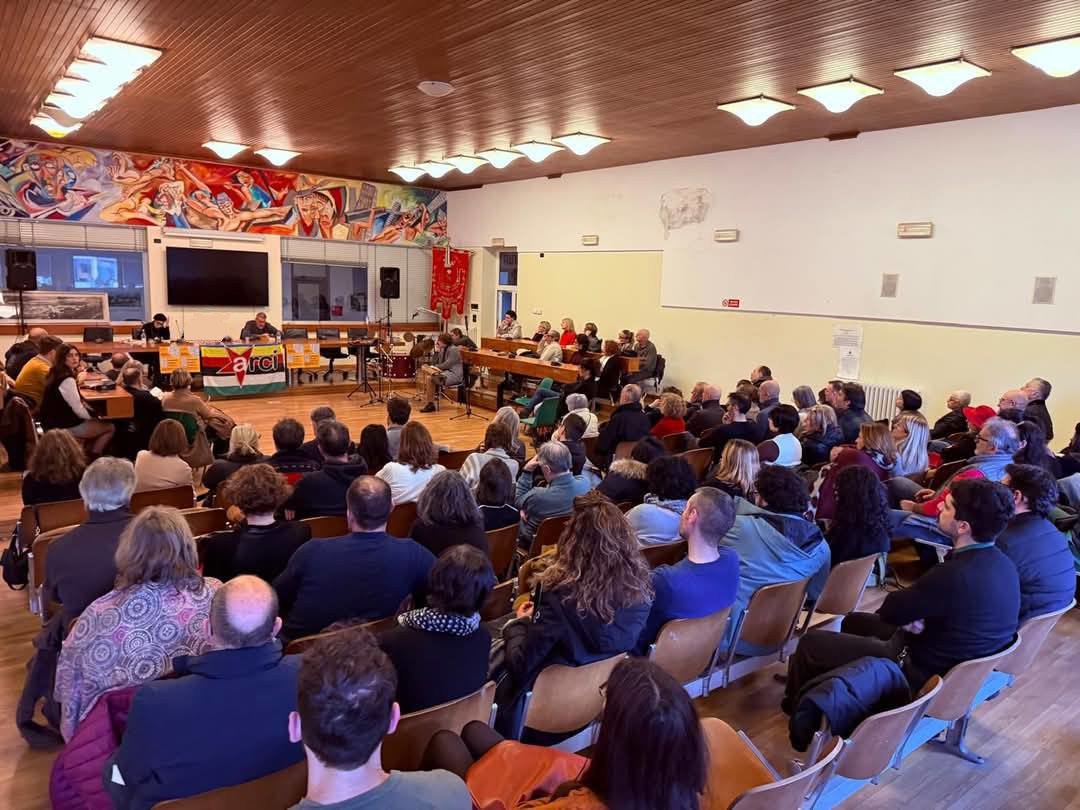
Aulla town council hall, 15 February 2025, presentation of Wu Ming 1’s book Gli uomini pesce. Aulla, in northwestern Tuscany, is one of the places where the novel Ufo 78 is set.
by Loredana Lipperini
[The original version of this interview was published on Lucy. Sulla cultura on 18 June 2025.]
A writer friend of mine, speaking about the situation of the Italian book industry, says that it’s like watching a car accident in slow motion: and I believe that to a large extent it is true. However, it’s equally true that there are other possibilities, and those possibilities are not exclusive to a literary genre (romance novels, which are currently eyed with wonder and, yes, envy), but rather to a different way of relating between writers and readers.
For this reason, I had a chat with Wu Ming 1, because the collective of writers has pursued that different way since the beginning, and it isn’t an anomaly, but a fact. Here’s what resulted from our exchange.
In recent weeks, there have been very worried discussions about the collapse of book sales in Italy: one million fewer copies in 2024 compared to the previous year. In this collective despair, fingers are pointed at readers, especially female readers who buy romance novels, which are always present at the top of the charts. This is not only an old story but also a very partial narrative. It’s true that sales are down: but not always, and not for everyone.
First of all, I’m not an expert in the publishing market, but it seems to me that overproduction skews the entire discussion. Back in 1980, about 43 million copies were sold. In 2024, they were 103 million, well more than double. So why is the situation negative? Because while just over 15,000 titles were published in 1980, in 2024 there were over 85,000, almost six times as many. Now, if sales double while production increases by six times, it’s clear there is a problem. Moreover, a large percentage of the books published last year sold fewer than a thousand copies, and many didn’t sell a single copy at all!
I do not want to deny the cultural dimension of the problem, which exists and weighs heavily: we are a country with few readers, and other distruptive factors add to this. For example, there’s much talk about the competition from TV series, which is real, but why does this happen? And how? Series follow the path of least resistance. Often, one comes home in the evening, exhausted from work and with little time to dedicate to oneself, and so one or two episodes of a Netflix show, often cookie-cutter stuff, promise less cognitive effort than a book. The same goes for social media and chats; it’s easier to end the evening that way rather than reading an essay or a novel. But then the problem lies upstream: it’s about exhausting everyday lives, mental fatigue, and dead-end jobs. Without these premises, the predatory activity of Big Tech platforms and their extractivism would be much more difficult.
Let’s add low wages and meager pensions… Many people can no longer afford to buy books.
All the more striking, then, is the immense quantity of new releases. All these books thrown into the fray, or rather, into a pile. And then to the shredder. When I think about it, I am reminded of the spectacular yet ephemeral tree-planting initiatives that many municipalities boast about, claiming to be “green”: “We are planting thousands, millions of trees!” Then you go to see these little trees: many are already dead or dying after a few months because they’re planted and then neglected; when drought comes, nobody waters them. Sometimes, those trees, born in nurseries, are all siblings, either from seed or cutting, so they’re attacked en masse by the same pathogen or suffer similarly from climate stress. Many are planted in the middle of concrete expanses—parking lots, usually—and ten meters apart, so they remain isolated and cannot support each other through their roots. The result is that very few survive. Just like in the book market.
I realize that in recent years the term “care” has been overused; it has become a catch-all, or at least a filler… But that’s exactly what is needed, a work of care. A book cannot just be written and published without care.
Now, let’s move on to another aspect. Wu Ming has always placed great emphasis on physical meetings with readers; a few years ago, Enrico Manera summarized your approach like this:
«Wu Ming has cemented the loyalty of its readers also thanks to real presentation tours, which are far from the huge-turnout-for-the-famous-writer-signing-autographs model. Wu Ming hold meetings in various places, from university classrooms to town halls to social centers, which become open seminars, indie concert-style readings, countercultural happenings, moments of performance, dialogue, and provocation depending on the audience.»
Recently, several writers have claimed that presentations are no longer useful, that the audience gets bored, or perhaps they don’t get bored but still don’t buy…
This is, at the very least, a generalization of personal experiences made by colleagues who don’t believe in presenting their books in public, or it isn’t in their nature, and they feel uncomfortable. This is legitimate; we are not all the same. However, it isn’t legitimate to speak on behalf of the entire category of writers, and even less to blame the audience. If the audience sees you fidgeting, notices that you’re sighing or looking at your watch, or if you respond to questions in an annoyed tone, it’s no surprise that they do not buy the book.
When I point out that my, our, experience is very different, I often hear: “Well, Wu Ming is a special case.” Of course, we have our distinct peculiarities. But I believe that part of our experience is common to other authors as well.
One very strong peculiarity is that we do not allow ourselves to be photographed or filmed, we do not go on TV, and we are not even on social media. We want to appear only in the flesh, which leads us to value and enhance at the maximum, by any means necessary, face-to-face meetings, physical participation, and the sharing of a place. Not just some generic “space”: a place, with its history, meaning, emotional significance, and importance to people. If someone recognizes us on the street, it is not because they’ve seen us in effigy through electronic mediation; it means they’ve shared one of those concrete and tangible moments with us, and they did so with their body alongside other bodies.
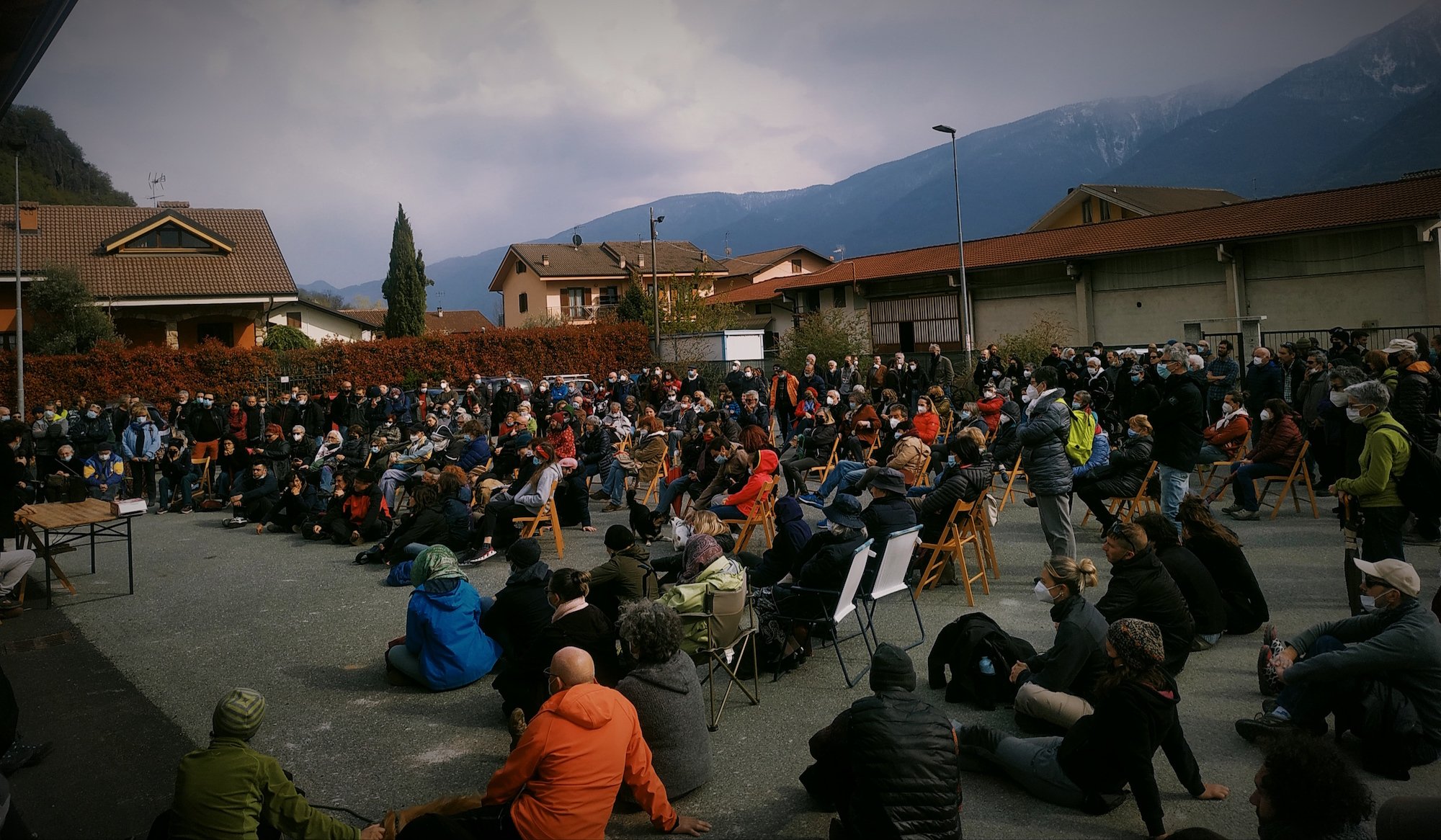
Civic centre of San Didero, Susa Valley, Piedmont, 18 April 2021. Presentation of the book La Q di Qomplotto by Wu Ming 1 in the epicentre of the No TAV struggle, which has been going on for more than 30 years.
Another peculiar trait is that, being Wu Ming a collective, we can be present in multiple places simultaneously, discussing our work—different aspects of our work, or different books, as is happening these weeks, with me promoting Gli uomini pesce and Wu Ming 4 promoting Il calcio del figlio—at the same time, hundreds of kilometers apart. This reminds me of Viktor Sklovskij writing about his friend Vladimir Mayakovsky: “The poet has openly divided himself into parts, holding himself in one hand like a player a deck of cards. He’s two, three, jack, king. The stakes of the game are love.”
Sklovskij wrote this in 1940, ten years after his friend’s death, so he added: “The game is lost.” Just before taking his own life, Mayakovsky wrote: “The boat of love has shattered against everyday life,” which is how the Russian word byt translates. The daily grind is the enemy of love. Specifically, the byt we live today is the true enemy of love for reading. But the game, for us, is still open.
Now, I come to the issue of sales: I’m keeping a personal statistic, so I have precise data. At the moment we are chatting, 1,782 copies of Gli uomini pesce have been sold at presentations. If this pace continues, by the end of the tour it will be around 2,700. For many authors in today’s Italy, that would already be a figure not to scoff at. I don’t have exact data on total sales yet, but it’s certainly between 21,000 and 25,000 copies, seven months after its release. To put this figure in context: in 2024, in Italy only 90 (ninety) books sold more than twenty thousand copies. And word of mouth is primarily driven by presentations.
Indeed, with Gli uomini pesce, you are engaged in a tour of almost one hundred thirty dates, with more than eighty already behind you.
Yes, and I think I will eventually write about it, compose a kind of reportage, because it’s an incredibly intense experience.
Touring is what brings a book to life the most, and in the best cases, it turns a book into a tool, like a Swiss army knife, available to those who inhabit the territories. In these months, Gli uomini pesce—certainly for the issues it addresses and how it does so, but also because I’m discussing it in public as much as possible—has become a device to catalyze energies and bring together different subjects. At the presentations of this book collaborations, alliances, and friendships have taken shape. This is not exclusive to Wu Ming’s books: mutatis mutandis, it can happen with other books; it has happened, and it happens.
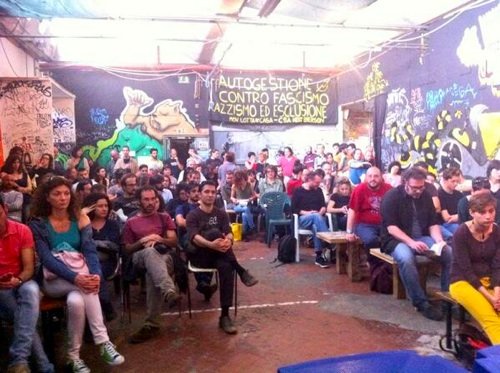
NextEmerson Social Centre, Florence, 18 May 2014: presentation of Wu Ming’s book L’Armata dei Sonnambuli.
Of course, not everyone can afford—due to their life or work circumstances, their age, or their ailments—to dedicate an entire year to presenting a book. But even without reaching my, um, extremes, if you make it clear that discussing your book is important and valuable to you, the response will be there.
It is also said that reviews do not help books, and this is an old argument. It is possible and perhaps quite true…
Our experience is that reviews are useful, but even in that case, care is needed. Reviews are part of the material to be used and valued, for example, by curating a reasoned florilegium that those organizing presentations can draw from for press releases, flyers, posters, and those who want to write about the book can engage with. It happens quite often that those who review Gli uomini pesce also “review” one or more previous reviews. This leads to further debate and resonance, and over the long term, this also has positive effects.
I have the feeling that there is a growing distrust, if not disdain, towards readers. Far from Baudelaire’s mon semblable, mon frère. It’s as if, used to interacting on social media, writers desire either unreserved appreciation, the equivalent of a like or a heart, or they fear insults. But you have met thousands of people on this tour, and they are, after all, the ones who have bought your book. Is the beauty of encounters perhaps being lost, here as elsewhere?
We have this “thing” about the body, about bodies. Without the body, you don’t get anywhere, literally. Resuming to do things together with our bodies is the only real way to stem the epidemic of loneliness, the terrible fraying of relationships. More and more people, lacking friendships, spend hours talking to a chatbot. In this desolate picture, those who make the effort to come to a book presentation are already doing something important. Only a fool can look at this with indifference, and only—if I may say so—an asshole can speak of it with disdain. Meeting readers is already political; I dare say it’s already a struggle. Literature is not political so much for its content, but for the relationships it can establish. Colleagues who think they can replace this with a constant presence—and a stream of trivial chatter—on social media are consigning themselves to irrelevance. Irrelevance not at a media level: irrelevance in the lives of real, flesh-and-blood people.

Sisma social centre, Macerata, 29 October 2022, presentation of Wu Ming’s book Ufo 78.
Meanwhile, book clubs and reading groups are growing and multiplying all over Italy. They are alive, active, curious. And isn’t that good news?
It certainly is! Personally, I am excited about this flourishing and I try to say yes to every invitation I receive from those circuits. The reading journey concludes with a comprehensive discussion, to which they may invite the author. Often, the meeting is open to the public, provided they have read the book. And so, one can speak freely, without worrying about spoiling surprises and plot twists. In fact, with Gli uomini pesce, we usually start by reading aloud the now-famous chapter 35. Famous, but at presentations, it dare not speak its name. Beyond this, if’t is already important and political, in the sense mentioned above, to leave the house to go to a presentation, it is even more so to be part of a reading group.
I wonder if younger authors, those who have started to move entirely in the world of social media, can take advantage of the same opportunities: as you mentioned, a community is created with the body, to begin with, and only then can it also move to the Internet. And not everyone who is popular on social media automatically achieves the same results. I think of Michela Murgia, for example, who was popular before she became active on Instagram.
To use a phrase common among my daughter’s peers, being only on social media is not deep. You surrender to the flow, thus to the evanescent. This doesn’t only concern younger authors; it’s a trend that already has a history. Where are most of the influencers and YouTubers from ten years ago today? More importantly, where are the books they published thanks to their online fame? In the same place where the books of bloggers that were “hot” in the 2000s ended up: the dustbin of history.
This concerns everyone, not just those who write books and want to promote them: when one is used to communicating only at a distance, transitioning to an “in-person” dimension—an expression that was pleonastic before Covid—is not easy; at the very least, there is awkwardness, if not real pain. As a friend of mine brilliantly summarized a few evenings ago: “Even when they want to be together, often girls and boys don’t know how to do it, and they argue, or they feel bad.” It is the initial hurdle. It is faced by helping each other, and it is overcome with continuity and familiarity.
Regarding colleagues: we, who have built the community over decades of activity and relationships, have something to say, some examples to share, some tips to give, some general and others more specific. The most important tip remains this: to do everything possible to reconnect, to be together, and to cooperate, to reclaim our bodies from the daily captivity they endure.
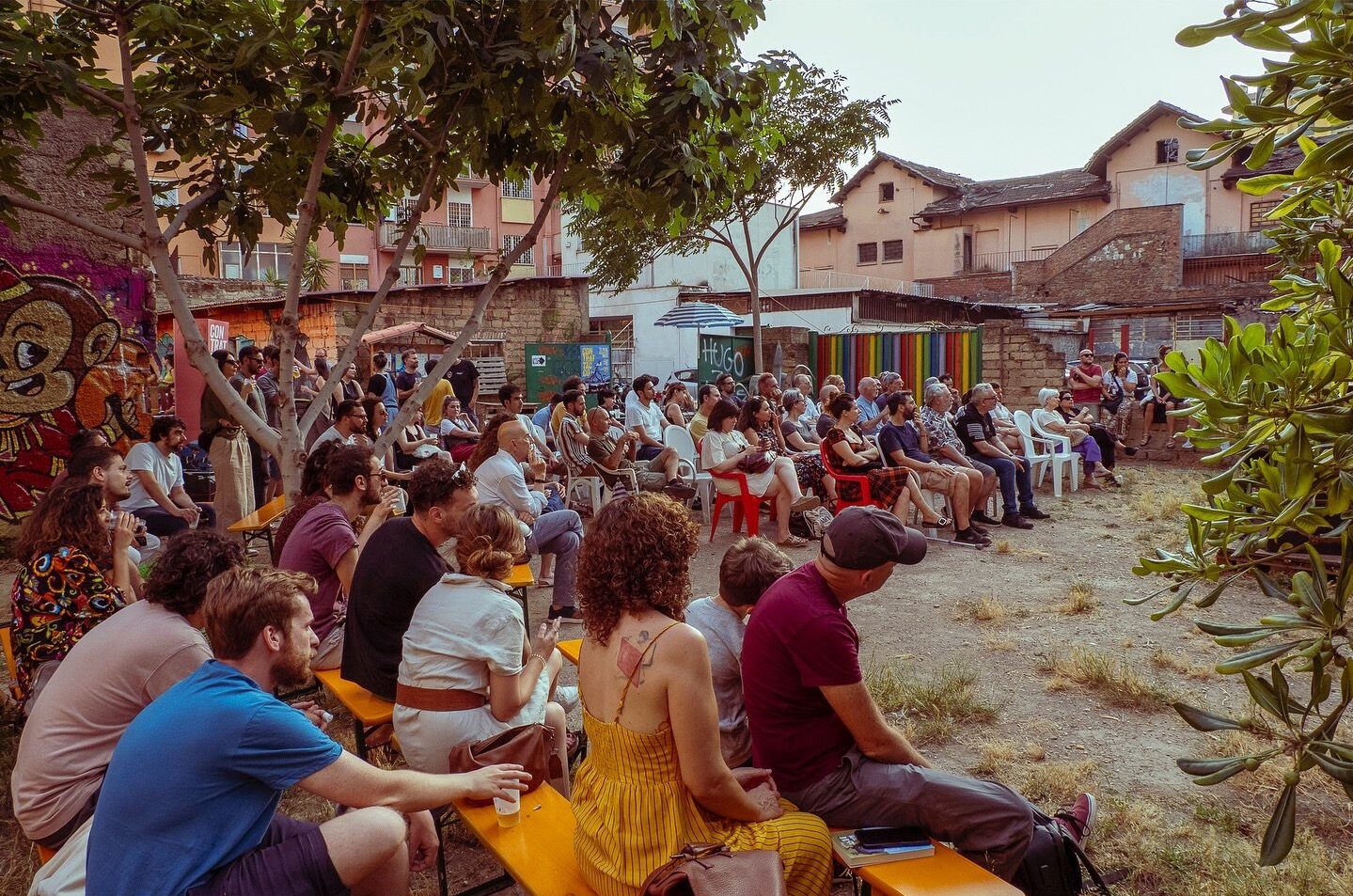
Contrattacco Festival, Rome, 14 June 2025. Presentation of Wu Ming 4’s book Il calcio del figlio.
Loredana Lipperini (Rome, 1956) is a writer, journalist and radio host, one of the most recognizable voices in Italian culture. For many years she hosted the Fahrenheit programme on Rai Radio 3, now she hosts the podcast Cose (molto) preziose. Since 2004 she has curated the blog Lipperatura. She is the author of several novels, short stories, children’s books and essays.
Wu Ming 1 is a member of the Wu Ming collective, with whom he has written several novels, including Q, 54, Manituana, Altai, L’Armata dei Sonnambuli, and Ufo 78, all of which have been published in various languages. As a solo author he has written, among other works, Point Lenana (with Roberto Santachiara, 2013), Un viaggio che non promettiamo breve (2016), La macchina del vento (2019), La Q di Qomplotto (2021), and Gli uomini pesce (2024). Due to his commitment to reporting on the No Tav movement and writing its history, the municipality of Mompantero, in the Susa Valley, awarded him honorary citizenship.
–

